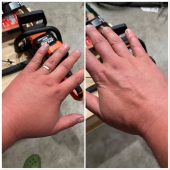
 9
9











 8
8




Visit Redhawk's soil series: https://permies.com/wiki/redhawk-soil
How permies.com works: https://permies.com/wiki/34193/permies-works-links-threads
 7
7











 8
8




r ranson wrote:Normally I wouldn't bother a nest like this. Just wait until winter.
Visit Redhawk's soil series: https://permies.com/wiki/redhawk-soil
How permies.com works: https://permies.com/wiki/34193/permies-works-links-threads
 6
6











 4
4











 5
5




r ranson wrote:I was hoping they were invasive and the government would remove them for free or something.
Visit Redhawk's soil series: https://permies.com/wiki/redhawk-soil
How permies.com works: https://permies.com/wiki/34193/permies-works-links-threads
 8
8




 4
4











 2
2











 5
5




To thin out problem wasps, I set up a shop vac with a 10' pipe as an extension to the nozzle. I prop it up in front of their hole, turn it on, and walk away for a while. Bump bump bump down the pipe they go. When I turn it off, I seal the end of the pipe. They usually expire in a day or so. If necessary, I will unseal the pipe and repeat the treatment the next day.

 5
5




How Permies works: https://permies.com/wiki/34193/permies-works-links-threads
My projects on Skye: The tree field, Growing and landracing, perennial polycultures, "Don't dream it - be it! "
 6
6




"The future is something which everyone reaches at the rate of sixty minutes an hour, whatever he does, whoever he is." C.S. Lewis
"When the whole world is running towards a cliff, he who is running in the opposite direction appears to have lost his mind." C.S. Lewis










 7
7




Wikipedia wrote:Dolichovespula species such as the aerial yellowjacket, D. arenaria, and the bald-faced hornet, tend to create exposed aerial nests.
 8
8











 8
8




 5
5





















 4
4
















 5
5




How Permies works: https://permies.com/wiki/34193/permies-works-links-threads
My projects on Skye: The tree field, Growing and landracing, perennial polycultures, "Don't dream it - be it! "
 7
7




Yes, the trick is to get something in place without People getting hurt.Tereza Okava wrote: Rig up a hammocky type thing? A tall platform? a high table? (not sure how viable that is with sheep).
Visit Redhawk's soil series: https://permies.com/wiki/redhawk-soil
How permies.com works: https://permies.com/wiki/34193/permies-works-links-threads
 8
8












 7
7











 2
2




Visit Redhawk's soil series: https://permies.com/wiki/redhawk-soil
How permies.com works: https://permies.com/wiki/34193/permies-works-links-threads
 6
6











 5
5




 8
8











 5
5











 6
6




Alas, unfortunately, the humans they deter tend to rile them all up before being deterred. Makes it risky for the rest of us!r ranson wrote:Another thing we observed, that they also make a great human deterrent.
It would be a great tool for introverts if we didn't have to make friends with a thousand or so wasps...
Visit Redhawk's soil series: https://permies.com/wiki/redhawk-soil
How permies.com works: https://permies.com/wiki/34193/permies-works-links-threads
 8
8











 12
12











 2
2




 3
3











 6
6











 1
1




"The future is something which everyone reaches at the rate of sixty minutes an hour, whatever he does, whoever he is." C.S. Lewis
"When the whole world is running towards a cliff, he who is running in the opposite direction appears to have lost his mind." C.S. Lewis

|
"How many licks ..." - I think all of this dog's research starts with these words. Tasty tiny ad:
rocket mass heater risers: materials and design eBook
https://permies.com/w/risers-ebook
|


